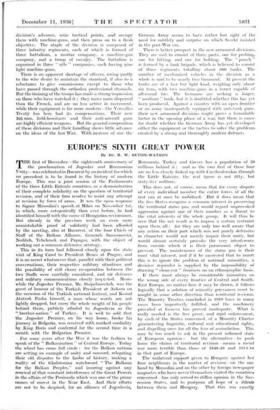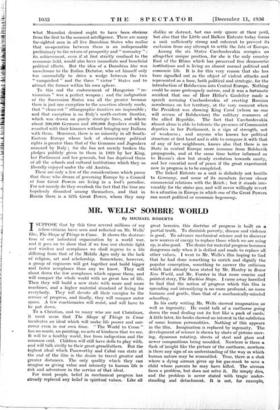EUROPE'S SIXTH GREAT POWER
By Dr. R. W. SETON-WATSON
ITHE first of December—the eighteenth anniversary of ¶f HE proclamation of Jugoslav and Ropinanian :Unitywas celebrated in Bucarest by an incident for which no precedent is to be, found in the history of modern Europe. This was a joint session of the Parliaments qf the three Little Entente countries, as a demonstration of their complete solidarity on the question of territorial revision, and of their firm resolve to resist any attempt at revision by force of arms. It was the open response to Signor Mussolini's speech at Milan on November 1st, in -which, more categorically than ever before, he had identified himself with the cause of Hungarian revisionism. But already in the previous week an even more unmistakable proof of solidarity had been afforded by the meeting, also at Ducarest, of the four Chiefs of Staff of the Balkan Alliance, Generals Sams.onovici, Neditch, Tchekmek and Papagos, with the object of working out a common defensive strategy.
This in its turn had followed closely upon the state visit of King Carol to President Benes at Prague, and it is no secret whatsoever that, parallel with their political conversations, .their respectiye military situations and the possibility of still closer co-operation between the two Staffs were carefully considered, and air defences and military coninninications closely insrected. Mean- while the Jugoslav Premier, Mr. Stojadinovitch, was the guest of honour of the Turkish President at Ankara on the occasion of the Turkish national festival, and Kemal Ataturk Pasha himself, a man whose words are not lightly dropped, but carry the whole weight of his people behind, them, publicly alluded to Jugoslavia as the ". brother-nation " of Turkey. It is well to add that the Jugoslay. Premier, on his way home, broke his journey in Bulgaria, was received with marked cordiality by :King Boris and conferred. for the second time in a month with the Bulgarian Premier.
- -For some years after the War it was the fashion to speak of the " Balkanisation " of Central Europe. Today the wheel has come full circle : for the Balkan nations are setting an example of unity and concord, relegating their old disputes to the limbo of history, making a reality of the Gladstonian watchword "The Balkans for the Balkan Peoples," and insuring against any renewal of that constant interference of the Great Powers in the affairs of the Peninsula which was one of the prime causes of unrest in the Near East. And their efforts are not to be despised, for an affiance of Jugoslavia, Roumania, Turkey and Greece has: a population of 56 millions behind it : and as the two first of these four are no less closely linked up with Czechoslovakia. through the Little Entente, the real figure is not fifty, but sixty-five millions.
This does not, of course, mean that for every dispute of every individual member the . entire forces of all the rest can at once be mobilised, .13a it does mean that the five States recognise a common interest, in preserving the territorial *lotus quo, and would regard unprovoked aggression against ope of their number as a threat to the vital interests of the whole group. It will thus be seen that the net result is to impose a certain restraint upon them all : for they are only too well aware that any action on their part which was not purely defensive in character would not merely impair their unity, but would almost certainly provoke the very interference from outside which it is their paramount object to prevent. The maintenance of the status quo is their most vital interest, and if it be answered that to assert this is to ignore the problem of national minorities, a decisive rejoinder is supplied by the impossibility of drawing " clean-cut " frontiers on an ethnographic basis.
If there must always be considerable minorities on the wrong side of every frontier of _Central and South- East Europe, no matter how it may be drawn, it follows 'logically that a solution of minority grievances must be sought in some other direction than territorial revision. The Minority Treaties concluded in 1919 have in many cases been imperfectly fulfilled, and the machinery provided at Geneva has proved inadequate. What is really needed is the free grant, and rigid enforcement, by each of the States concerned, of a Minority Charter guaranteeing linguistic, cultural and educational rights, and dispelling once for all the fear of assimilation. This may be too much to ask in the present inflamed state of European opinion : but the alternative—to push home the claims of territorial revision—means a racial war more terrible than those of 1848-49 and 1914-18 in that part of Europe.
The unilateral support given to Hungary against her four neighbours in the matter of revision—on the one hand by Mussolini, and on the other by foreign newspaper magnates' who have never themselves visited the countries concerned—has only served to stiffen opinion in the Suc- cession States, and to postpone all hope of a detente between them and Hungary. That this was exactly what Mussolini desired ought to have been obvious from the first to the meanest intelligence. There are many far-sighted men in all five Danubian States who realise that. co-operation between them is an indispensable preliminary to the return of prosperity and " normalcy " its achievement, even if at first strictly confined to the economic field, would also have immediate and beneficial political effects. But the idea of a Danubian bloc was unwelcome to the Italian Dictator, who set himself only too successfully to drive a wedge between the two " vanquished " and the three " victor " States and to attract the former within his own sphere.
To this end the endorsement of Hungarian " re- visionism " was a perfect weapon : and the indignation of the Succession States was all the greater because there is just one exception to the assertion already made, that " clean-cut " ethnographic frontiers are impossible ; and that exception is on Italy's north-eastern frontier, which was drawn on purely strategic lines, and where about 200,000 Germans and 400,000 Jugoslays could be reunited with their kinsmen without bringing any Italians with them. Moreover, there is no Minority in all South- Eastern Europe whose lack of elementary political rights is greater than that of the Germans and Jugoslays annexed by Italy ; for she has not merely broken the pledges publicly given to them in 1919 by her King, her Parliament and her generals, but has deprived them of all the schools and cultural institutions which they so liberally enjoyed under the old Austria.
These are only a few of the considerations which prove that those who dream of governing Europe by a Council of four Great Powers are living in a fool's paradise. For not merely do they overlook the fact that the four are hopelessly disunited among themselves, and that in Russia there is a fifth Great Power, whom they may dislike or distrust, but can only ignore at their peril, but also that the Little and Balkan Entente today forms a unit sufficiently strong and coherent to prevent, its exclusion from any attempt to settle the fate of Europe.
Among the six States Czechoslovakia occupies an altogether unique position, for she is the only country East of the Rhine which has preserved free democratic institutions and is living an almost normal political and economic life. It is for this very reason that she has been signalled out as the object of violent attacks and represented as a base, both political and strategic, for the introduction of Bolshevism into Central Europe. Nothing could be more grotesquely untrue, and it was a fortunate accident that one of Herr. Hitler's Gauleitcr made a speech accusing Czechoslovakia of erecting Russian aerodromes on her territory, at the very moment when the President was showing King Carol (whom no one will accuse of Bolshevism) the military . resources of the allied Republic. The fact that Czechoslovakia almost alone is able to tolerate the presence of Communist deputies in her Parliament, is a 'sign of strength, not of weakness ; and anyone who knows her political structure at first hand and is able to compare it with that of any of her neighbours, knows also that there is no State in central Europe more immune from Bolshevik propaganda, and at the same time better informed as to Russia's slow but steady evolution towards sanity, and her essential need of peace if the great experiment now in progress is to be completed. The linked Entente as a unit is definitely not hostile to Germany, and some of its members favour closer commercial relations with the Reich ; but it stands irre- vocably for the status quo, and will never, willingly revert to a situation in Europe in which one of the Great Powers can assert political or economic hegemony.

















































 Previous page
Previous page